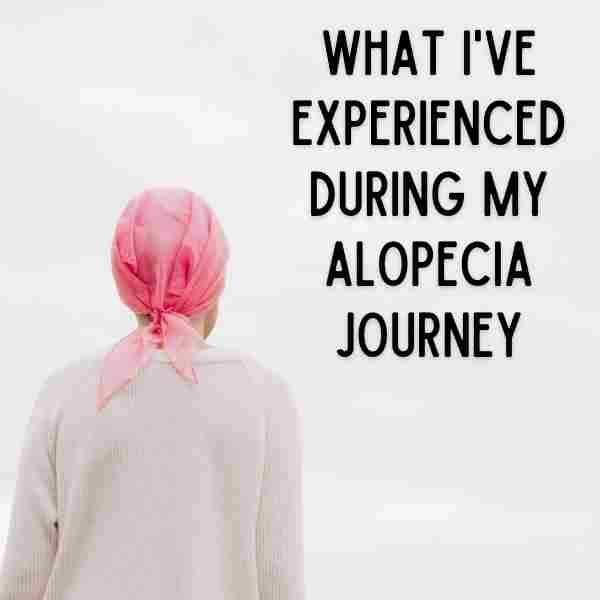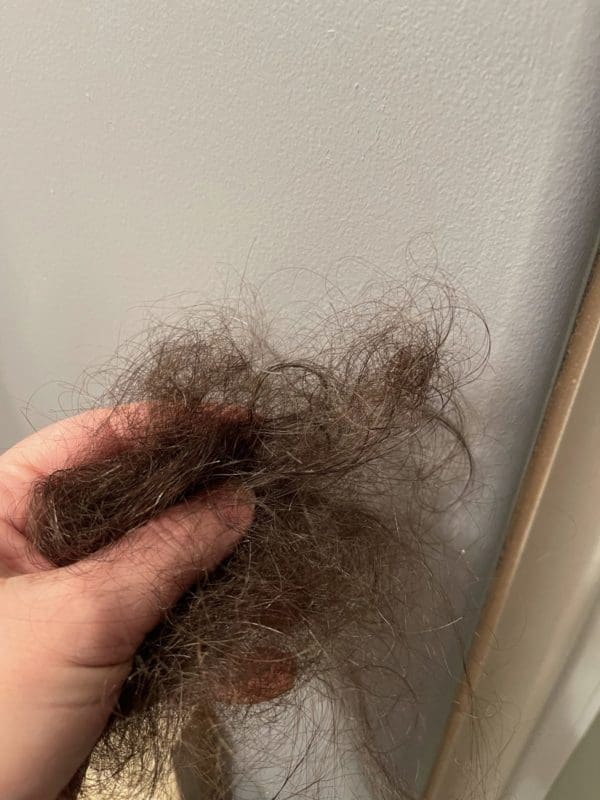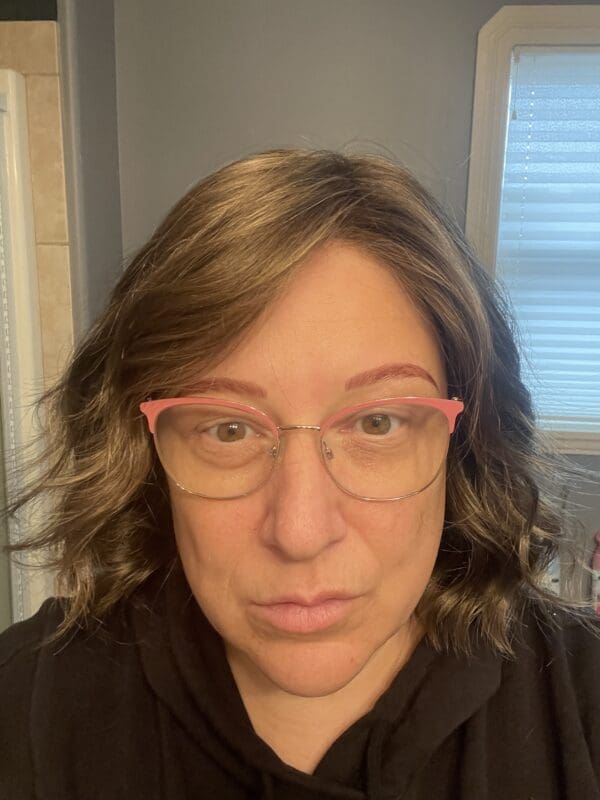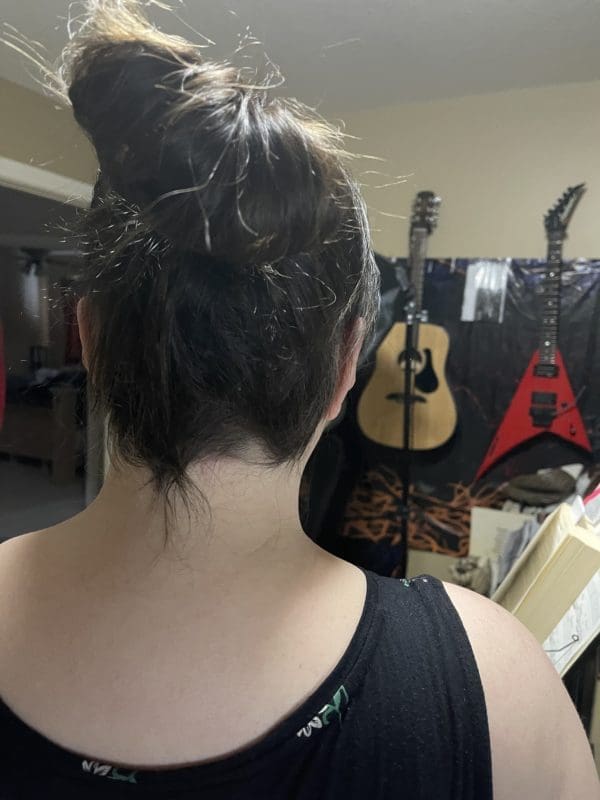Alopecia sprung up on me at the age of 42 and has stuck around for a few years now. I’ve said it before, and I’ll say it again, never in a million years did I think I would lose my hair. That’s just not something I worried about. Nobody in my family has hair loss or alopecia. I couldn’t believe it when I found my first bald spot, and when my hair started falling out (especially this second time around) I was upset, to say the least.
I was thinking about my experience with alopecia and there are some things that are just simple truths as I go through this alopecia journey.

1. Falling Into Same Old Hair Habits
I don’t have much hair left, but I do the same things I used to do when I had a ton of hair.
For instance, I use way too much shampoo. Every single time I’m shocked by how much shampoo I’ve put in my hand when I only have a few hairs on my head. It’s habitual for me to use the same amount every time.
I also still reach for the razor in the shower even though I don’t have hair growing anywhere on my body right now.
And when I get out of the shower, I still squeeze my long hair at the back of my head with the towel… even though there is no hair there!
2. Consistently Remembering Everything Said To Me About My Hair Or Anyone Else’s Hair
I can suddenly remember everything everyone has ever said about my hair or anyone else’s hair.
I can remember my husband telling me what beautiful hair I have throughout our relationship. It makes me feel bad to know that I don’t have that hair he thought was so beautiful.
I can remember every time someone in my life talked about someone’s bald or balding head – for whatever reason – and how they often saw it as a sad thing. It makes me feel like people look at me and feel sad, just like they did for all those people.
I remember all the times going out to the bar when I was young and how my friends would style my hair in a certain way that they thought looked good. I find it funny that I never cared that much, but my friends thought my natural hairstyle wasn’t worthy of going out.
I remember events by what was happening with my hair now, which is not something I thought of before.
It goes to show you that all those moments in your life are stored somewhere inside of your brain, and when you are really focused on something, you can see particulars in those events that you’ve never noticed before.
3. Missing My Old Hairstyles
I miss putting my hair up, curling it, pinning it, and even just clipping it back.
I’ve never been one to obsess about my hair, but I always liked the way it looked when I took some time to do something with it, and I liked having the option TO do something with it. Now I don’t have that option and I miss the opportunity.
4. Getting Hurt Much Easier By Insensitive Comments
I can relate to the whole Jada Pinkett Smith and Will Smith issue at the Oscars on a level that most people probably can’t. I know that Jada Pinkett Smith is public about her alopecia and embraces it on some level (and she looks damn good), but I’m sure it’s still an emotional issue in their house. And a joke – even though I don’t think it was a crack at her alopecia – can stir up those emotions in a quick, hot mess and cause someone to do something incredibly uncalled for and stupid.
Little comments by the most well-intentioned people in my life can be hurtful, even if they were not meant to be hurtful.
Even suggestions on what I should do or try with my alopecia can sting as if I caused my alopecia and I can just fix it easily.
It’s a sensitive topic and I’ve found it very important to try to keep things in perspective and see things from other people’s points of view.
5. Not Looking Forward To Going Out As Much
I’m at a spot where I’m not totally comfortable with a wig, toque, hat, scarf, or my almost baldness. I don’t know what to wear when I go out. I feel a little uncomfortable no matter what I choose, and it’s just not the same as when I had a full head of hair.
Knowing I have to go see someone I haven’t seen in a long time soon is not fun. I really just would rather not go.
Even getting together with family and friends who know I have alopecia and have seen me before brings on some dread as I think about what I want to wear on my head and how they will view me depending on what I wear and how they feel.
6. Increased Acceptance Of What Is
One thing that has been good for me on this alopecia journey is the continuous need to accept where I am or else I’ll go nuts.
Being present and accepting what is has always been a struggle for me, and this alopecia is forcing me to accept what it is and take it more day by day than I ever have.
The problem is that being obsessed about what’s going to happen with my hair in the future is too stressful. It’s overwhelming. It’s maddening. And I can’t live in those states of being for a long time or I could create more serious health problems.
It is what it is. Nobody has any answers on how I will progress with my alopecia. Even though so many people have it, it’s such an unresearched and mysterious disease.
In my opinion, they should know what causes it and have solutions, but they don’t. And I have to accept that whatever is going to happen is going to happen.
7. I Like Being Around Someone Else With Alopecia
I joined a few alopecia groups online and they are pretty good. It’s nice to talk to other people thriving despite their alopecia, and sharing struggles makes you feel not so alone.
But, when I went and bought my wig, that’s where I felt the best with my alopecia. I had never met someone in person with alopecia before that experience. The girl who helped me try on wigs also had alopecia, and it was so nice to be around someone else who is living with what you are living with. I felt like I could just be myself without having to hide my hair loss around her.
The first time I saw her, she was wearing a wig and false eyelashes. The second time I saw her, she had no wig on and it was so relatable to me that I’m surprised I didn’t cry. I felt so comfortable around her. I almost wish I had a friend with alopecia. I think it would be very comforting to get together and have a deep understanding of how the other feels.


